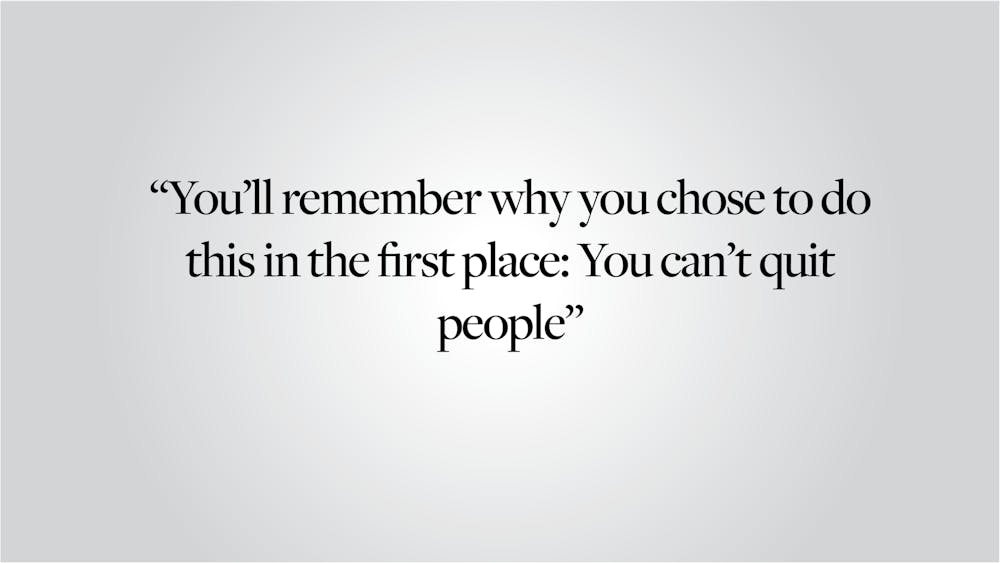A sulfuric puddle of yolk erupted against the fence, pooling in the cracks of the simmering Havana sidewalk. Having watched me nudge along the small, white “ball” for two blocks, oblivious, my cousins roared with laughter as I stood in shock at the mess on the concrete like a runny yellow punchline. An egg.
In Cuban folk magic, Lukumi is the practice of rubbing a chicken egg over the body and head to trap negative energies, often used to treat common illnesses. Medicine in Cuba is a unique combination of evidence-based treatments and home remedies much like Lukumi. Despite practicing within a severely overburdened and flawed health system, Cuban doctors, and others in similarly under-resourced countries, are a force equipped with years of clinical training that begins immediately in undergraduate university years.
Like most first-year premedical students in the U.S, I've never worked directly with patients. We’re too busy googling our chemistry graduate TAs to see if there’s any grunt work that needs to be done in a lab somewhere for a few measly research hours. Or, we’re researching the best-paying specialties in anticipation of the crippling debt from eight years of schooling — I don’t need to speak to how the U.S. medical education system is flawed. What I will say is this: Maybe the first change we should make is to our attitude towards the profession. We should return to the question “why medicine?”
On the same family visit where I famously kicked a Lukumi egg, I accompanied my aunt, a general practitioner in Havana, through a day of door-to-door visits to her patients. The rest of the day followed suit: an elderly woman with shingles (and her husband complaining of knee pain), their upstairs neighbor with arthritis, a construction worker who had herniated a disc. At first, in the face of everything I knew about “modern medicine,” I could only pity these people who relied on headless chickens and vivaporrub in place of technologically advanced treatments. In the absence of accessible health services, though, I realized the importance of combining encyclopedic knowledge with the human practicality of a barber-surgeon.
In the early history of medicine, a physician was everything from a literal barber to a literal surgeon. They dealt with all aspects of their patient’s health and well-being. Today, medicine has become increasingly specialized. Additionally, while one in four deaths in America is caused by heart disease, that figure is rarely followed by the fact that Black men have a 70% higher risk of heart failure than white men, or that Hispanic women are twice as likely to have type 2 diabetes than white women. We simply cannot address the first issue on its own; it requires in-depth, systemic knowledge about American society. The problem is that the U.S. healthcare system is reactionary instead of preventative, a well-documented issue that has not only indirectly raised medical costs, but has trickled down to the way we train our doctors.
A primary care doctor once told me that when asked about what interests me in medicine, I shouldn’t answer with my desired specialty. Quoting her, you “have no business” saying you want to do pediatric reconstructive trauma surgery until you’ve changed a urostomy bag. As a pre-med student, whether you end up cutting people’s brains open or managing an elderly patient’s diabetes, your heart and mind should still be set on helping the person in front of you. Amidst the late-night study sessions, the grunt work in the lab, the humbling experience of cold-emailing professors for research and all of the burnout, the end-goal is to use it all in a way that means something to someone one day. The only way I see out of the pre-med rat race is to let yourself be humbled; to honor the potential of how you might help people through a steadfast faith in the nobler parts of each other.
There’s a crude joke among pre-meds that a bad grade in orgo or physio will have you end up going to medical school in the Caribbean. The irony there is that, while we were playing with molecular model kits or sterilizing pipette tips, medical students like those in Cuba have been seeing patients and healing. In the end, isn’t that the goal? When exams don’t go as planned – when eggs crack at your very feet – and you think about quitting medicine altogether, you’ll remember why you chose to do this in the first place: You can’t quit people.
Camila Valdes '27 can be reached at camila_valdes@brown.edu. Please send responses to this column to letters@browndailyherald.com and other op-eds to opinions@browndailyherald.com




